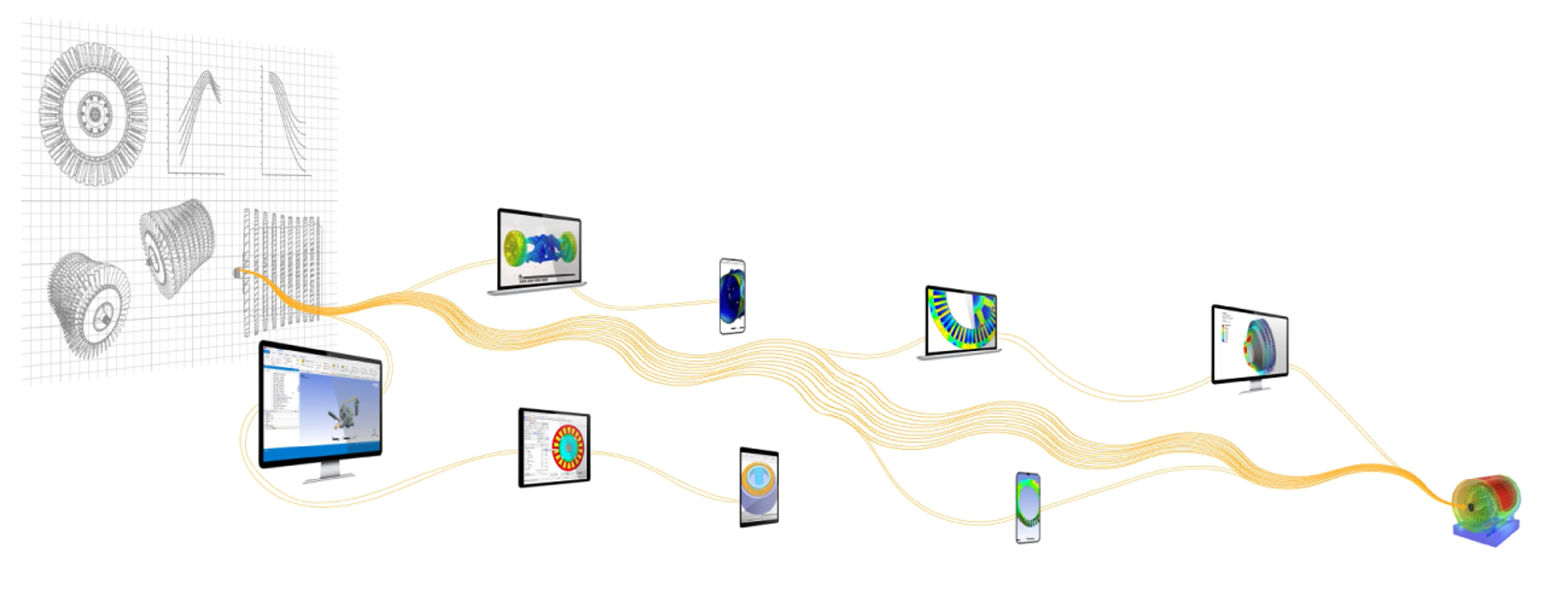Enhance engineering workflows with robust simulation tools designed to replicate the behavior of real-world assets in multidomain environments. Our solutions provide advanced capabilities like reduced-order modeling (ROM), co-simulation, and real-time data integration, allowing engineers to model complex systems involving electrical, mechanical, and fluid dynamics. They support high-fidelity simulations of system interactions, enabling precise predictive maintenance and operational optimization. Seamlessly integrated into existing CAE workflows, these tools offer flexibility through APIs and FMI-compliant environments, ensuring compatibility with third-party software like MATLAB and Simulink. Outstanding features result in faster simulation times and more accurate results, reducing design iterations and enhancing system performance across multiple domains. The system's flexible architecture also supports high-performance computing (HPC) configurations, allowing You to handle large datasets and run complex simulations in parallel.
- Multiple Format Export
- 3D Visualization, Animation
- Process Automation
- Customizable Workflows
- Parametric Design and Optimization
- High-Fidelity Environmental Modeling
- Automated Failure Mode and Effects Analysis (FMEA)
- Integration for Predictive Maintenance
- Collaborative Simulation Environment
- Automated Data Validation
- Data Management System Integration
- Design of Experiments (DOE)
- System-Level Multiphysics Simulation
- Custom Report Generation
- Model Calibration
- Performance Evaluation
Capabilities
Ansys solutions provide a diverse set of capabilities that push engineering workflows to new heights. Engineers can take advantage of rapid prototyping, advanced system optimization, and full system integration, supported by cutting-edge APIs and tools for real-time data analysis. This ensures enhanced reliability, faster iteration, and reduced development time.
Explore our capabilities!
Multidomain System Modeling
Multidomain system modeling integrates multiple physical domains—such as mechanical, electrical, and fluid—into a single simulation framework. This method enables engineers to evaluate system behavior more holistically, capturing the interactions between different components. Ansys Twin Builder and Ansys STK provide the necessary tools for creating detailed multidomain models, making it easier to analyze system performance and optimize for real-world operations.
Software
Reduced-Order Modeling (ROM)
Reduced-Order Modeling (ROM) offers an efficient way to simulate complex systems by reducing the computational resources required. ROMs capture the essential dynamics of high-fidelity models, allowing engineers to run simulations more quickly. Ansys Twin Builder and Ansys optiSLang leverage ROM techniques to accelerate simulations in fields like aerospace, automotive, and energy, helping engineers make faster design decisions while maintaining precision.
Software
Embedded Software Integration
Embedded software integration allows engineers to incorporate control systems directly into system simulations, enabling real-time testing and validation of embedded code alongside physical models. Ansys Twin Builder integrates seamlessly with tools like Ansys SCADE for embedded control software, while also supporting MATLAB/Simulink for model-in-the-loop (MiL) and software-in-the-loop (SiL) testing, making them essential for industries like automotive and aerospace where safety and reliability are critical.
Software
Co-Simulation of Electrical, Mechanical, and Fluid Systems
Simulating the dynamic interactions between electrical, mechanical, and fluid systems is crucial for understanding the performance of complex designs like hybrid vehicles or power systems. Ansys Twin Builder offers powerful co-simulation capabilities that are enhanced by integration with other Ansys tools such as Ansys Fluent, Ansys Mechanical, Ansys Maxwell. For extended modeling, Twin Builder supports MATLAB/Simulink and Modelica, providing a detailed analysis of complex designs in real-world conditions.
Software
Predictive Maintenance and System Diagnostics
Using advanced predictive algorithms allows engineers to monitor system health in real-time, diagnosing issues and predicting maintenance needs well in advance. The capability is enhanced by integration with Ansys Cloud for real-time data access, enabling system diagnostics based on actual asset performance. Digital twins created in Twin Builder enable precise tracking of system degradation and wear, facilitating proactive maintenance decisions. This combination helps reduce maintenance costs, improve system uptime, and extend asset lifecycles.
Software
High-Performance Computing (HPC) Integration
Access to HPC resources through Ansys Cloud allows to perform high-fidelity simulations more efficiently, reducing time-to-result for large, complex models. Whether using Ansys Twin Builder for digital twin creation or Ansys optiSLang for design optimization, HPC integration provides the computational power needed to accelerate simulations. With scalable cloud-based infrastructure, users can seamlessly expand their computing capabilities to meet the demands of intricate engineering problems, from parametric sweeps to system-level co-simulations.
Software
Model-in-the-Loop (MiL) and Software-in-the-Loop (SiL) Testing
Model-in-the-Loop (MiL) and Software-in-the-Loop (SiL) testing are essential for validating control systems early in the development process. Ansys Twin Builder supports MiL and SiL testing by integrating embedded control software with physical models, allowing engineers to verify system behavior in real-time. Combined with Ansys SCADE for control design, these testing methods ensure that control algorithms function correctly before hardware implementation.
Software
Seamless API and FMI-Compliant Integration
With FMI-compliant integration and a robust API, Ansys solutions offer flexible, scalable workflows for simulation and system modeling. Ansys Twin Builder allows the integration of third-party models from Simulink or Modelica, making it ideal for co-simulation in complex, multidomain systems. The API support provided by Ansys optiSLang, Ansys Minerva and Ansys STK ensures seamless data exchange between tools, allowing engineers to automate processes and efficiently connect different software environments, boosting productivity and accuracy in simulation tasks.
Software
Automated Optimization and Sensitivity Analysis
Optimization and sensitivity analysis are essential for refining complex designs. Ansys optiSLang offers powerful tools for running parametric studies, automating the optimization of design variables, and conducting sensitivity analysis to reveal critical influences on system behavior. By integrating with Ansys Twin Builder for system simulations and Ansys Minerva for streamlined data management, this combination accelerates the optimization process, delivering faster and more reliable design outcomes.
Software
Manage and track simulation data across teams
Ensuring consistent simulation data management across distributed teams is crucial for maintaining model accuracy and operational efficiency in large-scale engineering environments. Ansys Minerva enables collaborative workflows by allowing engineers to access and modify simulation models in a shared environment, supported by real-time version control, comprehensive traceability, and secure access management. The platform’s automated data validation processes ensure that only verified, up-to-date data is utilized, minimizing errors and enhancing coordination.
Software
Perform hazard analysis, fault tree analysis (FTA), and failure modes and effects analysis (FMEA)
Safety-critical systems demand rigorous hazard analysis, FTA, and FMEA to mitigate risks and ensure compliance with standards like IEC 61508 or ISO 26262. Ansys Medini Analyze offers an all-in-one solution for automating these analyses, enabling engineers to evaluate system failure modes, track potential failure chains through fault trees, and identify critical points of failure. With real-time data integration, our solution enhances failure prediction accuracy and simplifies safety assessments for large-scale, multidisciplinary projects.
Software
Analyze aerospace, defense, and telecommunication analyses
Accurate analysis of aerospace, defense, and telecommunication scenarios requires advanced simulation capabilities. Ansys STK offers precise, time-dynamic modeling tools that simulate satellite orbits, communication networks, and defense system operations. You can model interactions between assets across air, space, land, and sea, ensuring every aspect of mission performance is accurately evaluated. With built-in support for RF environments and sensor modeling, STK provides the fidelity needed to optimize mission planning and system design.
Software
Software Sales
If you have any general questions about our Ansys, Moldex3D, Dante, Particleworks, or CF Turbo simulation software (quotation, licensing, training), please contact us using one of the following contact details. Please note that our software is only available to customers from the following countries: Hungary, Slovenia, Croatia, Serbia, Bosnia and Herzegovina, Montenegro, and Macedonia.
sales (at) econengineering.com
+36 1 279 0320

Greg Lipóczi, Dr.
Commercial Director

László Molnár, Ph.D.
Academic & Key Account Representative

Péter Bara
Key Account Manager
East Hungary

János Simon
Key Account Manager
West Hungary


